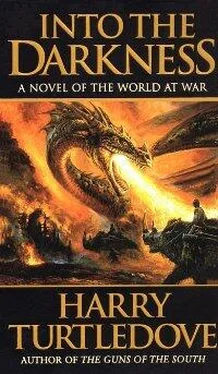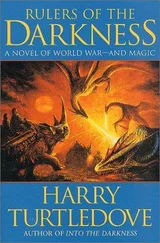Knowing Huk, Magnulf ruled in his favor and did not punish him. Leudast waited for some outburst from the villagers. It didn’t come. They looked to Arnulf. Arnulf stood by his doorway, dour but silent.
Two nights later, Leudast woke with cramps in his belly. So did Gernot, at just the same time. Their unwilling hosts stayed asleep, apparently well. “Are we poisoned?” Gernot whispered.
“I don’t think so,” Leudast whispered back. “I think we’re magicked.” He paused, then chuckled grimly as pieces fit together in his mind. “The firstman, or else his wife. But they’d have to be better mages than they are to break through the protections King Swemmel’s soldiers get. They’ll be sorry they tried, too. Come on.”
The cramps pained him, but not so much that he couldn’t move. He and Gernot stole out of the hut. He wasn’t surprised to see other Unkerlanter soldiers coming out of the houses where they were billeted. When he saw Magnulf, he pointed toward the firstman’s home. The sergeant nodded.
Behind the shutters there, a light was burning. Stick in one hand, Leudast tried the door with the other. It wasn’t barred. If Arnulf and his wife were village wizards, who would dare steal from them? He threw the door wide.
Arnulf and his wife looked up in horror from where they crouched over an image—a cloth doll—in a rock-gray tunic. The firstman’s wife still held a long, brass-headed pin in her hand. Her face twisted in a ghastly attempt at a smile. Arnulf knew smiles were wasted. Cursing, he threw himself at Leudast and the other Unkerlanters behind him.
Leudast blazed him down, then blazed his wife, too. He also blazed the doll, lest a stronger mage get hold of it. “That’s good,” Magnulf said. “That’s very good.”
“Aye,” Leudast said. “We shouldn’t have any more trouble here.”
Colonel Lurcanio came up to Krasta and gave her an extravagant Algarvian bow. “Milady, I am given to understand there is to be an entertainment laid on at the Viscount Valnu’s this evening. Would you do me the honor of accompanying me there?”
She hesitated. However well Lurcanio spoke Valmieran, he remained one of the conquerors. She recalled all too well the feel of his hard hand against her cheek—scarcely a proper prelude to an invitation in her circle or any circle she knew. And, had any Algarvian sought to invite her, she would have preferred Captain Mosco, who was both younger and handsomer than his superior.
Still… Lurcanio was the more prominent of the two of them. If she turned him down, what would he do to her? Whatever he likes rang like a mournful bell in her mind, a bell with a nasty undertone of fear. The other side of the coin was that any entertainment at Valnu’s was sure to be lavish and likely to be scandalous. She wanted to go, both to enjoy herself and to be able to hold her head up among her own set.
That decided her. With a smile the brighter for coming a beat or two late, she said, “Thank you, Colonel. I would be delighted.”
Lurcanio’s answering smile might have been pleased, might have been predatory, and was probably both at once. “Excellent!” he said, and bowed again. “Most excellent. Shall we meet at the front door at sunset? My driver will do the honors, the invitation being mine. He knows the way.”
So Lurcanio had gone to Valnu’s before, had he, and without her? Her back stiffened. She’d make sure he didn’t want to do that again. She never went into anything halfheartedly. When she answered, “Till sunset, then, Colonel,” her voice had a purr in it. She put a little extra in her walk as she went upstairs to primp and plan for the evening ahead. She didn’t look back to see if the Algarvian noble’s eyes were following her. She knew they would be.
After bathing, after a hairdresser piled her hair into a mound of curls (an old-fashioned style suddenly popular again), she chose her outfit. The trousers of midnight velvet she put on were so tight, Bauska had to help lace them closed. “Easy, there,” Kaunian wheezed. “I want to be able to breathe, a little.
“Aye, milady,” Bauska said, and pulled them tighter yet. Her head was bent to the work, so Krasta did not see her smile. Krasta did admire the effect in the looking glass, which made her servant bite her lip.
The tunic Krasta chose was filmier than the nighttime one in which she had gone to upbraid Lurcanio and Mosco over the coronation of King Mezentio’s brother as the new ruler of Jelgava. Then, though, the display had been inadvertent. Now it was intentional, even calculated. She wanted Lurcanio’s eyes to pop.
She wanted to pick the time when they would pop, too, so she draped a short cape of glistening beaver fur over her shoulders to let her choose the moment and to protect her against the chill of the autumn evening. Snow hadn’t started falling yet, but it wasn’t more than a month away.
Rather knobby knees aside, Lurcanio looked dashing in dress tunic, kilt striped in his kingdom’s colors, and a broad-brimmed plumed hat. He bowed over Krasta’s hand, then raised it to his lips. “You are lovely this evening,” he murmured. “You are, no doubt, lovely every evening, but you are particularly lovely this evening.”
“I thank you,” Krasta said in a smaller voice than she’d intended. The Algarvian officer could be charming when he chose. That he could also be anything but only made the charm more interesting.
Lurcanio’s driver devoured Krasta with his eyes when the colonel handed her up into the carriage. Krasta expected Lurcanio to dress him down; he was impossibly forward. Instead, laughing, Lurcanio leaned forward to pat him on the shoulder and spoke to him in Algarvian. Krasta caught Valnu’s name. The carriage rolled forward.
“That fellow’s rude,” Krasta complained.
“No.” Lurcanio laughed again, and shook his head. “He is Algarvian. When it comes to pretty women, we do not hide what we think.” He too looked Krasta up and down, slowly and lingeringly. She decided she could have done without the cape, at least as far as concealment went.
She was glad to have it, though; her breath smoked when she breathed out.
Valnu’s house, not far from the center of Priekule, would have been classically elegant had he not painted columns and frieze in gaudy colors. He insisted that was good classical usage, and would wave learned articles to prove it. As far as Krasta was concerned, classical meant plain white marble, and that was that. Valnu, though, had never been one to keep his enthusiasms from running away with him.
He stood in the entrance hall, greeting guests as they arrived. When he saw Krasta, something simultaneously amused and malicious kindled in his eyes. He spoke to Colonel Lurcanio in Algarvian. Lurcanio raised an eyebrow. When he and Krasta had gone on into the main salon, he asked her, “Why did he say I should not be alone with you on a dark country road?”
“You’d better ask him that, hadn’t you?” Krasta said with a toss of the head that set her curls flying. She spotted a servant watching wraps. When she shrugged off her cape, she discovered that Lurcanio hadn’t imagined everything about her, not if the way his head swiveled was any sign.
Up on a platform at the back of the salon, a harpist and a couple of viol players performed one Algarvian tune after another. Used to the more emphatic rhythms of Valmieran music, Krasta wondered why anyone would bother listening to this. But Lurcanio smiled and bobbed his head in time to the songs that were so familiar to him, as did many of the other Algarvians who had come to Valnu’s residence.
Looking around, Krasta saw that a lot of Algarvian officers and civilian functionaries had come to Valnu’s. They outnumbered the Valmieran men there and, almost without exception, they had very pretty girls on their arms. Not all the girls, or even most of them, were of noble blood, either. Krasta knew who was. The rest… Opportunists, she thought scornfully.
Читать дальше












